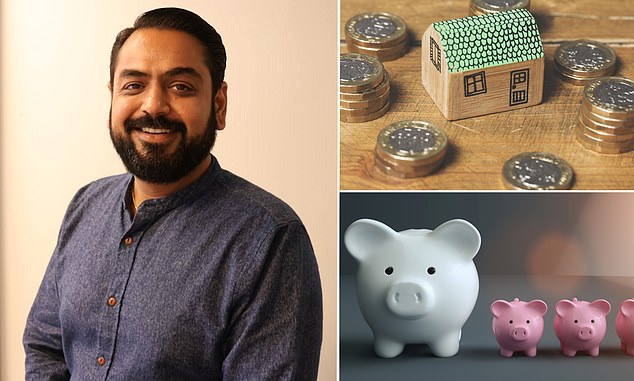My partner and I would like to buy our first home this year, but we’re not sure we can do it.
We think we could get a small house in our area for around £270,000 and we should have a deposit of around £30,000 when we come to buy it.
I earn £39,000 and he earns £36,000 so our combined income is £75,000. Is it likely that we could get a mortgage for the amount we need and how much would that be each month?
Our rent is currently £1,300 a month and we could pay a little more than this, but buying it would wipe out all our savings.
Can they do it? The prospect of buying a home is exciting, but our readers want to check that they can cover all the costs. We asked mortgage broker Ravesh Patel for advice
Hopefully we could rebuild an emergency fund reasonably quickly as we would no longer be saving for a deposit.
Are there other costs we should consider when buying or owning a home? Can we afford to buy it?
Ed Magnus from This is Money responds: Firstly, congratulations on saving a deposit. That won’t have been easy in recent years amid high inflation and rising rents.
Lenders will typically ask you to pay at least 5 percent of the value of the property and, in many cases, 10 or 15 percent.
If you think you can raise a £30,000 deposit to buy a £270,000 house later this year, it will mean you have passed the 10 per cent threshold.
It’s also worth considering the additional costs of buying a home, as this can affect your deposit. You will also need to pay fees to a conveyancer or solicitor, which can be up to £3,000 depending on where you buy.
You are also likely to pay for an independent survey before exchanging contracts, which can detect if there are any problems with the property, such as subsidence, damp or rot. These tend to range between £300 and £1,500.
You may also want to leave some financial wiggle room for the cost of furnishing the house when you move in or for any immediate repairs that may await you.
Luckily, you won’t have to take stamp duty into account. Currently, first-time buyers, who have never owned a property before, get a tax reduction, with stamp duty starting at £425,000 instead of the standard threshold of £250,000.
Once you’ve cleared your deposit, you need to know how big a mortgage you can borrow and what your mortgage payments will be.
This will be decided by the mortgage lender based on your income, age, other debts and monthly expenses.
An easy way to establish the type of mortgage you could get is to talk to a mortgage broker. They will be able to carry out an affordability check to see what the maximum you can borrow is.
To do this, they will need information from your bank statements, payroll or tax returns.
As a general rule, most lenders typically limit people to borrowing no more than 4.5 times their annual income.
However, it may be lower if you have other loans and debts, or potentially higher if your income and expenses are strong.
It’s also possible to borrow more than 4.5 times your income with certain lenders, depending on how much you earn and how big your deposit is.
There are also certain lenders that offer higher multiples for certain professions.
You may have to change your expectations once you’ve done your research, but hopefully your deposit and maximum home loan will be enough to buy the type of house you would be happy with, in the area you want to live.
For expert advice, we spoke to ravesh pateldirector and senior mortgage consultant at broker Reside Mortgages for his insight into his situation.

Expert: Ravesh Patel, Director and Senior Mortgage Consultant at Reside Mortgages
Ravesh Patel replies: Based on your combined income, buying a property for around £270,000 with a £30,000 deposit seems affordable to you.
You may even be able to borrow more, as some lenders can offer up to five times your income.
However, factors such as your age, your expenses, your existing debts and whether you are a UK citizen all play a role.
It is best to consult a mortgage advisor to explore all your options so you can make an informed decision.
Monthly mortgage payments depend on the rate you qualify for and the overall term of your mortgage.
For example, if we look at an interest rate of 5.19 per cent, a mortgage amount of £240,000 will cost around £1,316 per month over a 30-year term and £1,188 per month over a 30-year term. 40 years old.
However, a longer mortgage term means paying tens of thousands more in interest overall.
A mortgage advisor can help you find the right balance between term and monthly payments, taking into account your living costs so you don’t become financially overburdened.
You should also consider other costs such as stamp duty. As a first-time buyer, you won’t pay any stamp duty on properties under £425,000, a significant saving.
Some lenders may charge a product fee ranging from £0 to £1,499, and there may be a valuation fee of around £200. Legal fees for a purchase price of £370,000 can be around £1,500, depending on the solicitor.
Finally, it is advisable to have a reserve fund in addition to your deposit for unexpected expenses or improvements to the property.
Some links in this article may be affiliate links. If you click on them, we may earn a small commission. That helps us fund This Is Money and keep it free to use. We do not write articles to promote products. We do not allow any commercial relationship to affect our editorial independence.


